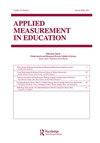形成性评估在美国K-12教育中的有效性和特点:系统综述
IF 1.1
4区 教育学
Q3 EDUCATION & EDUCATIONAL RESEARCH
引用次数: 44
摘要
摘要在本文中,我们对以往进行形成性评估干预以改善学生学习的实证研究进行了系统的回顾。先前关于形成性评估对学生学习的总体影响的荟萃分析研究是结论性的,但很少研究形成性评估干预措施的重要特征及其对美国K-12教育系统学生学习的不同影响。从代表25个符合纳入标准(例如,包括控制条件)的研究项目的33项研究中,对确定的126个影响大小进行了分析,结果显示,形成性评估对学生学习的总体影响较小(d=.29),对数学(d=.34)、识字(d=.33),通过元回归分析进行的进一步调查表明,支持学生发起的自我评估(d=.61)和通过中等周期长度(在教学单元内或教学单元之间;d=.52)提供正式的形成性评估证据(例如,测验的书面反馈;d=.40)可以提高形成性评估的有效性。本文章由计算机程序翻译,如有差异,请以英文原文为准。
The Effectiveness and Features of Formative Assessment in US K-12 Education: A Systematic Review
ABSTRACT In the present article, we present a systematical review of previous empirical studies that conducted formative assessment interventions to improve student learning. Previous meta-analysis research on the overall effects of formative assessment on student learning has been conclusive, but little has been studied on important features of formative assessment interventions and their differential impacts on student learning in the United States’ K-12 education system. Analysis of the identified 126 effect sizes from the selected 33 studies representing 25 research projects that met the inclusion criteria (e.g., included a control condition) revealed an overall small-sized positive effect of formative assessment on student learning (d = .29) with benefits for mathematics (d = .34), literacy (d = .33), and arts (d = .29). Further investigation with meta-regression analyses indicated that supporting student-initiated self-assessment (d = .61) and providing formal formative assessment evidence (e.g., written feedback on quizzes; d = .40) via a medium-cycle length (within or between instructional units; d = .52) were found to enhance the effectiveness of formative assessments.
求助全文
通过发布文献求助,成功后即可免费获取论文全文。
去求助
来源期刊

Applied Measurement in Education
Multiple-
CiteScore
2.50
自引率
13.30%
发文量
14
期刊介绍:
Because interaction between the domains of research and application is critical to the evaluation and improvement of new educational measurement practices, Applied Measurement in Education" prime objective is to improve communication between academicians and practitioners. To help bridge the gap between theory and practice, articles in this journal describe original research studies, innovative strategies for solving educational measurement problems, and integrative reviews of current approaches to contemporary measurement issues. Peer Review Policy: All review papers in this journal have undergone editorial screening and peer review.
 求助内容:
求助内容: 应助结果提醒方式:
应助结果提醒方式:


